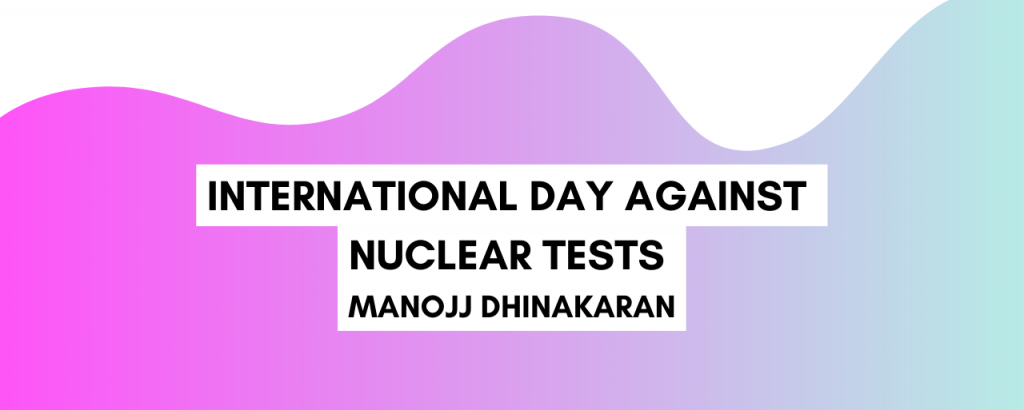History On second December 2009, the United Nations General Assembly unanimously settled to observe August 29th as the International Day Against Nuclear Test, to commemorate the closing of the Soviet Union’s nuclear test site, Semipalatinsk in 1991. This historic moment ushered the member nations to drop their nuclear testing globally. Why this is Important Nuclear […]

On second December 2009, the United Nations General Assembly unanimously settled to observe August 29th as the International Day Against Nuclear Test, to commemorate the closing of the Soviet Union’s nuclear test site, Semipalatinsk in 1991. This historic moment ushered the member nations to drop their nuclear testing globally.
Nuclear weapons pose a great threat to both the environment and living beings. A single blast could obliterate everything in its path within a 2.5 km radius, emitting heat and radiation that could be millions of temperatures high – as hot as the sun’s core. No living being will be spared within a 13 km radius.
The common misconception is that everything happens in a second, but the truth is it has various stages and the effects could last for years – not only in the detonated region; if powerful it could impact the country or the world, killing everyone slowly. The destruction comes like waves after waves to the farther zones – first with the heatwave charring the vegetation, then a shock wave destroying buildings and others and finally the radioactive debris that falls out like fine rain dust contaminating everything.
It is paramount to understand that nothing could be done to help the people in a nuclear bomb affected zone. There is no modern technology that confers immunity against radiation exposure, nor treatment to save the afflicted. Moreover, no help of any form can be rendered to the site at least for months due to the radioactive ash and rain that would cover the city. People who have survived the blast will not have truly escaped as they will be exposed to lethal nuclear radiation enough to disable/kill them.
Radioactive exposure can modify and disrupt the DNA of living beings, contributing to deadly diseases like cancer to the exposed and create disabilities in the offspring of the exposed. The effects of genetic diseases and stillbirths will last for generations to come. The land of the detonation will be uninhabitable with no growth of vegetation, like a scorching desert.
A nuclear bomb today could cause the deaths of 20 million people – a figure greater than that of WWI – during a nuclear war amongst countries with limited arsenals. The impact massively increases while factoring countries with developed nuclear arsenals. Nuclear bombs have an impact on global climate too. The global temperature can decrease by 20 Fahrenheit resulting in reduced rainfall throughout the world, with the effects lasting to a decade. This is just the surface of the many problems that would arrive.
Due to these reasons, the UN had called in for the Comprehensive Nuclear Test Ban Treaty (CTBT) asking its member nations to curtail its nuclear armaments. Till date only 168 countries have ratified it; to come into full effect some significant other members have to sign in too. The International Day Against Nuclear Tests aims to bring awareness of the effects of weaponizing nuclear power and its complete eradication. Money spent on nuclear weapons and its testing could be diverted for the benefit of several other pressing issues within nations. War is not the answer and nuclear war is definitely not an option to undertake.
“Each person had a name. Each person was loved by someone. Let us ensure that their deaths were not in vain.”
–Setsuko Thurlow, survivor of the Hiroshima bombing.
We here at HibiscusFoundation believe in eradication of nuclear weapons and stand in solidarity to promote awareness on nuclear war and its dangerous effects. We believe in peace and peace alone. The world has seen enough devastation and we hope to see no more caused by nuclear weapons. Use #saynotonukewar to spread awareness and be a part of the movement.
Writer: Manojj Dhinakaran